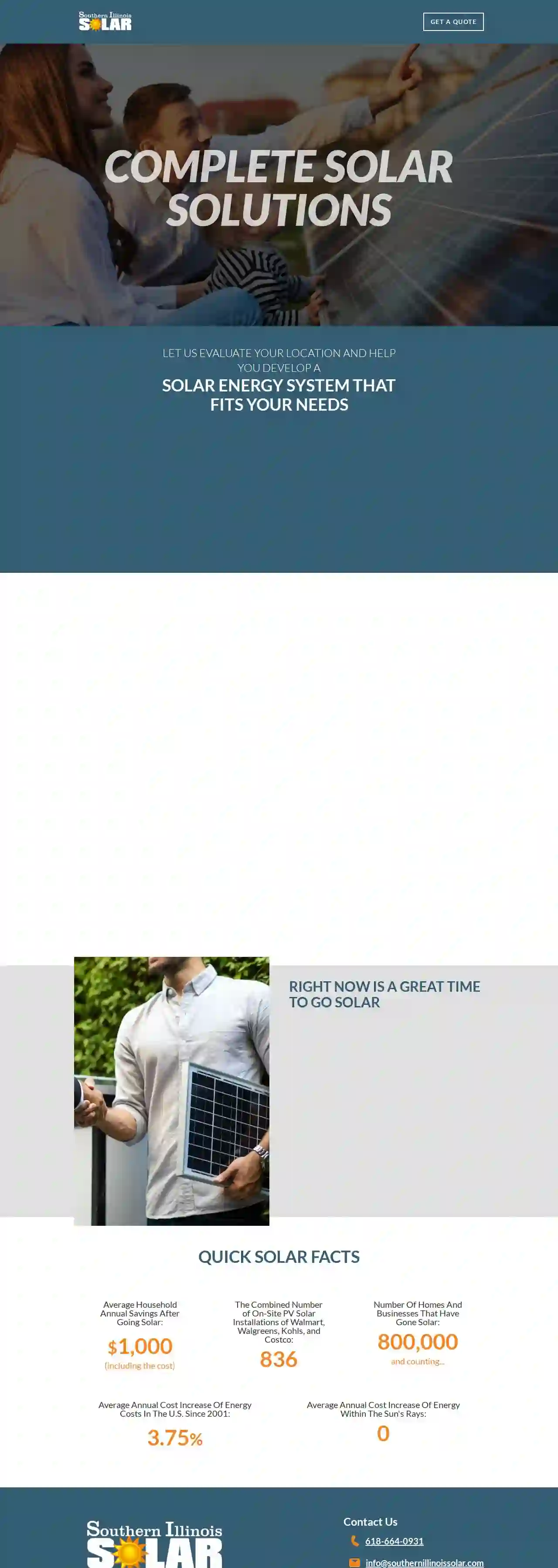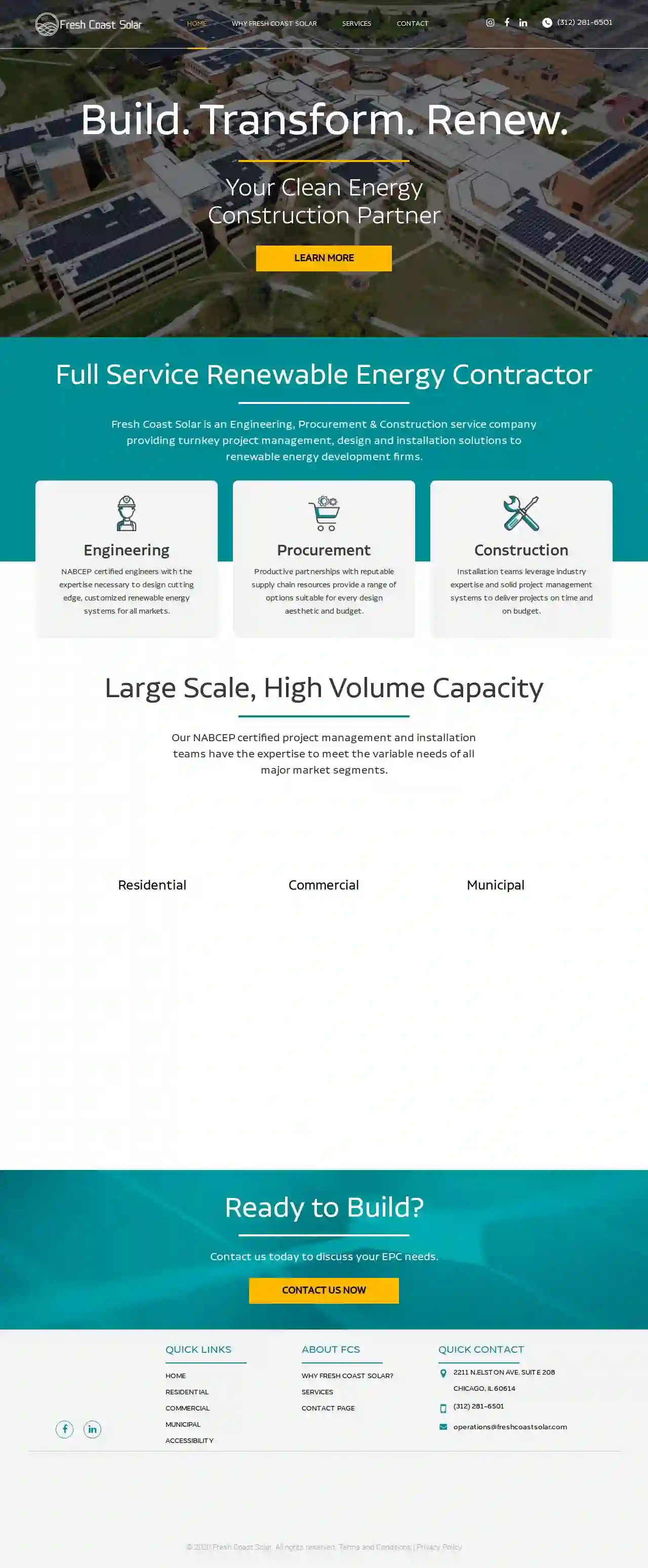Solar Installers Carlinville
Top Solar Company in Carlinville
Receive multiple Solar Companies quotes for your project today! Compare profiles, reviews, accreditations, portfolio, etc... and choose the best offer.

Solar Contractors Chicago
275 Payson St, Hoffman Estates, 60169, USSolarCC is your go-to resource for the best solar panel and electric vehicle (EV) charging businesses in Chicago and the surrounding Illinois cities. Learn vital information about solar panel installations, such as tax breaks, special features, discounts, and prevailing trends. Discover our blog, offering insightful information, data, and learning tools about solar energy and electric vehicle charging.
- Services
- Why Us?
- Accreditations
- Our Team
- Testimonials
- Gallery
Get Quote
StraightUp Solar
55 reviewsMarion, IL, 11580 IL-37, 62959, USStraightUp Solar is a solar installation company in Marion, IL, that empowers neighbors to take control of their power with clean energy solar solutions. With over 2,800 solar arrays installed under the same ownership for over a decade, our licensed professionals manage every step of your project, from design to build to maintenance and beyond.
- Services
- Why Us?
- Accreditations
- Our Team
- Testimonials
- Gallery
Get Quote
Simply Solar Illinois
4.816 reviewsSimply Solar Illinois, Bethalto, Illinois, 123 Solar Lane, 62010, USSimply Solar Illinois specializes in providing customized solar solutions for residential, commercial, and agricultural properties. Our team works closely with clients to understand their energy requirements and design a solar system that maximizes energy savings. We handle everything from initial assessment and design to installation and ongoing maintenance. By switching to solar energy, clients can significantly reduce their operating costs, enhance their sustainability efforts, and take advantage of various tax incentives and rebates.
- Services
- Why Us?
- Accreditations
- Our Team
- Testimonials
- Gallery
Get Quote
SunVolt Solar
51 reviews1040 Airport Rd, Mt. Vernon, 62864, USSunVolt Solar is a local business that specializes in providing solar energy solutions for residential and commercial properties. They offer a range of services including solar mounts, location assessments, and consultations to help clients transition to green energy. SunVolt Solar emphasizes the benefits of solar energy such as incentives, green energy, good investment, and affordability. They have a team of experts who work closely with clients to understand their electricity usage and provide tailored solutions. SunVolt Solar has offices in Illinois, Colorado, and Florida.
- Services
- Why Us?
- Accreditations
- Our Team
- Testimonials
- Gallery
Get Quote
IM Sustainable
4.932 reviews920 S Spring St., N/A, Springfield, 62704, USIM Sustainable is a solar panel installation company with locations in Illinois and Missouri. We bring sustainable solutions to the community by delivering turn-key solar energy systems.
- Services
- Why Us?
- Accreditations
- Our Team
- Testimonials
- Gallery
Get Quote
Unity Solar Group
416 reviewsUnity Solar Group, Suite 100, 123 Solar Street, Solar City, 12345, USUnity Solar Group is dedicated to democratizing solar energy and simplifying the process for businesses and residents seeking to harness renewable power. Our primary mission revolves around educating and exceeding the expectations of our customers, empowering them to embrace self-generation of clean energy.
- Services
- Why Us?
- Accreditations
- Our Team
- Testimonials
- Gallery
Get Quote
Southern Illinois Solar
4.610 reviewsCarbondale, IL, 123 Solar Way, 62960, USSouthern Illinois Solar is a leading provider of solar energy solutions for residential, commercial, agricultural, and public sectors. They offer complete solar solutions, including renewable energy credits, 30% federal tax credit, and increased home value for residential clients. For commercial clients, they provide reduced operating costs, reduced pollution, and federal and state tax credits. Agricultural clients can benefit from decreased pollution, decreased fuel costs, and decreased maintenance costs, with subsidies and tax credits available. Public sector clients can stretch their budget further with solar energy, benefiting from municipalities, police departments, libraries, school districts, and public works. The company highlights the benefits of solar energy, including reduced costs, tax credits, and environmental benefits.
- Services
- Why Us?
- Accreditations
- Our Team
- Testimonials
- Gallery
Get Quote
Advanced Power USA
514 reviews123 Main St, Suite 100, Aurora, 60001, USAdvanced Power USA is a company that specializes in providing clean, renewable energy to homeowners through solar power. They offer a range of services including installation, maintenance, and consultation to help homeowners make the switch to solar energy. Their team consists of experienced professionals who are dedicated to providing high-quality service and ensuring customer satisfaction.
- Services
- Why Us?
- Accreditations
- Our Team
- Testimonials
- Gallery
Get Quote
Fresh Coast Solar, LLC
4.611 reviews2211 N. Elston Ave. Suite 208, Chicago, 60614, USFresh Coast Solar is an Engineering, Procurement & Construction service company providing turnkey project management, design and installation solutions to renewable energy development firms. They offer services in engineering, procurement, and construction, with expertise in designing cutting-edge, customized renewable energy systems for all markets. Their installation teams leverage industry expertise and solid project management systems to deliver projects on time and on budget.
- Services
- Why Us?
- Accreditations
- Gallery
Get Quote
Radiant Solar
52 reviews2012 Tin Cup Rd Unit B, PO Box 343, Mahomet, 61853, USRadiant Solar is a solar company in Champaign County serving Central Illinois. A Veteran owned and family operated business , we aim to provide affordable, quality, green energy solar panel installations to our customers by cutting out the middle-man. Not only saving you money now, but for years into the future.
- Services
- Why Us?
- Accreditations
- Gallery
Get Quote
Over 4,210+ Solar Companies on our platform
Our solar pros operate in Carlinville and surrounding areas!
SolarCompaniesHub has curated and vetted the Best Solar Companies in Carlinville. Find the most reliable pro today.
Frequently Asked Questions About Solar Installers
- System size (measured in kilowatts, or kW)
- Type of solar panels (monocrystalline, polycrystalline, thin-film)
- Roof complexity (pitch, size, obstructions)
- Labor costs in your area
- Available incentives and rebates
- Use a Directory Like SolarCompaniesHub: We connect you with pre-screened, qualified solar installers in your area.
- Check Online Reviews: Look for positive reviews on Google, Yelp, and other reputable sources.
- Ask for Referrals: Get recommendations from friends, family, or neighbors who have gone solar.
- Verify Credentials: Ensure the installer is licensed, insured, and certified by reputable organizations (e.g., NABCEP in the US).
- Get Multiple Quotes: Compare quotes from at least 3-4 installers to find the best value for your project.
- Ask Questions: Don't hesitate to ask installers about their experience, warranties, and the process they follow.
- Contact SolarCompaniesHub: We make it simple to connect with reputable Solar Installers in your area.
- Get Free Quotes: Request free quotes from multiple installers to compare prices, systems, and warranties.
- Schedule a Site Assessment: A qualified installer will visit your property to assess your roof, energy needs, and discuss your goals.
- Review Your Proposal and Contract: Carefully review the proposed system, financing options, and warranties before signing a contract.
- Installation and Activation: Once the contract is signed, the installer will obtain necessary permits, schedule the installation, and activate your solar system.
What is the average cost of solar panel installation in USA?
How do I find a good solar installer near me?
How do I get started with solar panel installation?
Do I need to replace my roof before installing solar panels?
What is the average cost of solar panel installation in USA?
- System size (measured in kilowatts, or kW)
- Type of solar panels (monocrystalline, polycrystalline, thin-film)
- Roof complexity (pitch, size, obstructions)
- Labor costs in your area
- Available incentives and rebates
How do I find a good solar installer near me?
- Use a Directory Like SolarCompaniesHub: We connect you with pre-screened, qualified solar installers in your area.
- Check Online Reviews: Look for positive reviews on Google, Yelp, and other reputable sources.
- Ask for Referrals: Get recommendations from friends, family, or neighbors who have gone solar.
- Verify Credentials: Ensure the installer is licensed, insured, and certified by reputable organizations (e.g., NABCEP in the US).
- Get Multiple Quotes: Compare quotes from at least 3-4 installers to find the best value for your project.
- Ask Questions: Don't hesitate to ask installers about their experience, warranties, and the process they follow.
How do I get started with solar panel installation?
- Contact SolarCompaniesHub: We make it simple to connect with reputable Solar Installers in your area.
- Get Free Quotes: Request free quotes from multiple installers to compare prices, systems, and warranties.
- Schedule a Site Assessment: A qualified installer will visit your property to assess your roof, energy needs, and discuss your goals.
- Review Your Proposal and Contract: Carefully review the proposed system, financing options, and warranties before signing a contract.
- Installation and Activation: Once the contract is signed, the installer will obtain necessary permits, schedule the installation, and activate your solar system.